Surprise, surprise! When world leaders pay secret visits
- Published
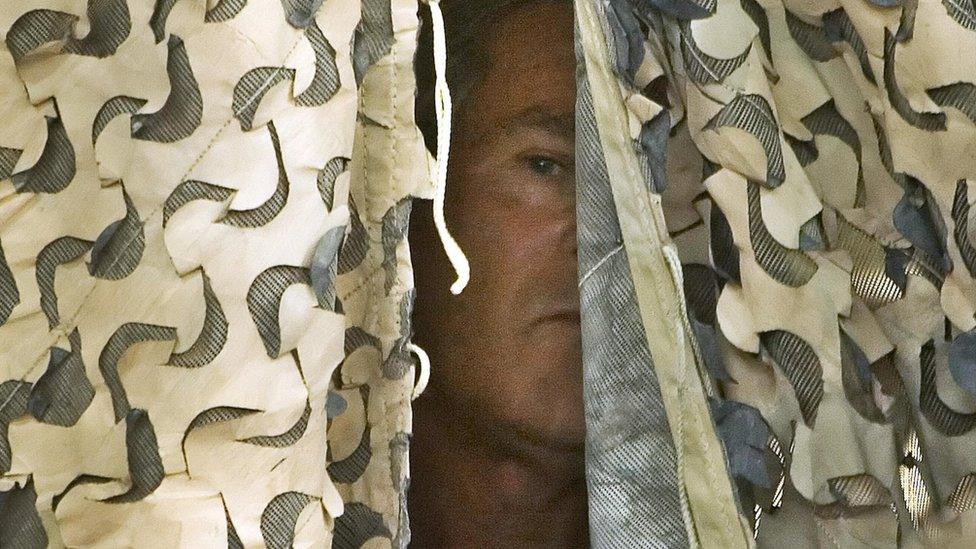
During his tenure, former US President George W Bush made repeated unannounced morale-boosting - and publicity-generating - visits to troops in Iraq and Afghanistan
Syria President Bashar al-Assad's surprise visit to Moscow dominated Wednesday's headlines.
The visit - the first time Mr Assad has left Syria since the civil war ignited in 2011 - was seen as a coup for the embattled leader, a symbol of his resurgence against the forces confronting him at home and of the confidence Moscow places in a man whose prospects seemed precarious only weeks ago.
But security concerns meant details of Mr Assad's trip were only made public on his return to Syria, and such concerns clearly lie behind the secrecy of many an unannounced visit by a leader.
Almost every visit by a Western figure to a warzone since the US-led invasion of Afghanistan in 2001 has been done without warning.
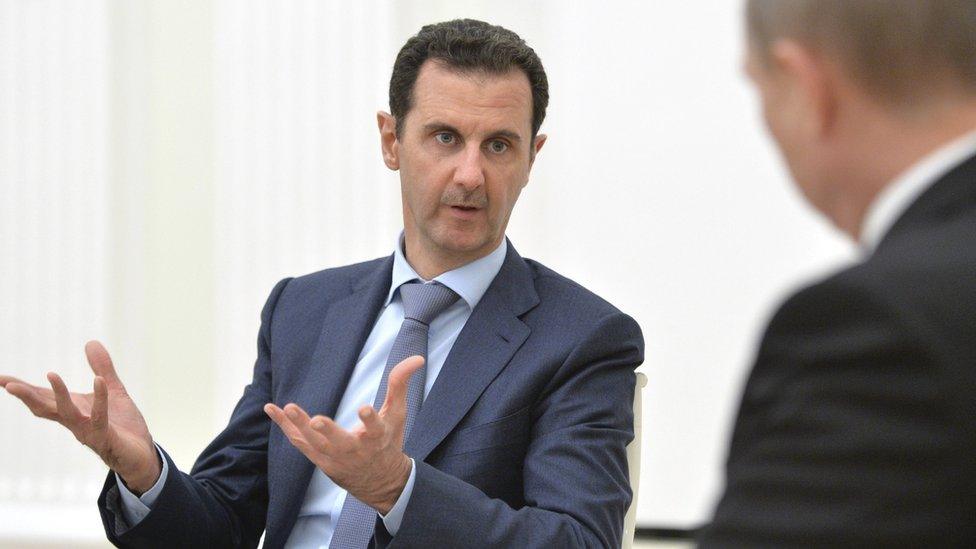
Mr Assad's visit tells the watching public that he is secure enough to be able to leave Damascus - and that he has a powerful backer in Moscow
US President Barack Obama made regular unannounced visits to Afghanistan, as did Britain's Prime Minister Tony Blair to Iraq.
Earlier this year Secretary of State John Kerry turned up in Somalia, a war-ravaged state currently waging an armed campaign against al-Shabab Islamist rebels - with reports suggesting even Somali officials believed a more junior US official would be attending.
But clearly these leaders - and their advisers - judge that the advantages of paying these visits outweigh the attendant security risks, both in terms of boosting morale of personnel overseas and in giving the leader in question a PR lift.
Cheering and applause
Such motives were clearly visible when Mr Obama's predecessor, George W Bush, visited troops in Iraq in November 2003, eight months after Saddam Hussein was toppled and amid a growing insurgency against the occupying forces.
Footage showed him appearing, literally unannounced, to the uproarious cheering and applause of the soldiers at a Thanksgiving ceremony. He was later pictured triumphantly bringing in turkey to troops at the subsequent feast.
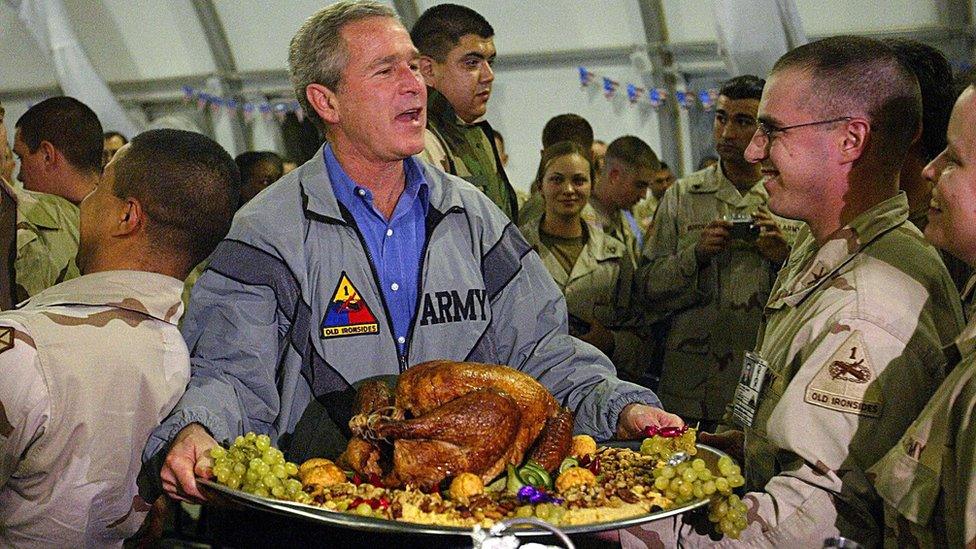
Leaders clearly judge that the benefits of personal visits to troops fighting overseas outweigh the risks
Security concerns were such that reporters were only permitted to publicise his visit after he had left - and White House officials later revealed that if any word had leaked out, the visit would have been cancelled, even if Mr Bush had been in the air.
Sometimes a visit feels sudden and unscripted because of the ground-breaking diplomatic nature of the trip.
On 20 November 1977, Egyptian President Anwar Sadat arrived unannounced in Israel, where he was received by Prime Minister Menachem Begin and went on to give a historic address at the Knesset.
The visit was not entirely unexpected. President Sadat had publicly signalled his willingness to break the pan-Arab front against negotiating with Israel in a bid to pursue, as he put it, a "permanent peace based on justice".
But the exceedingly sensitive nature of the visit meant planning had to be carried out in private, with the "top secret" details of Israeli preparations only finally released in 2012.
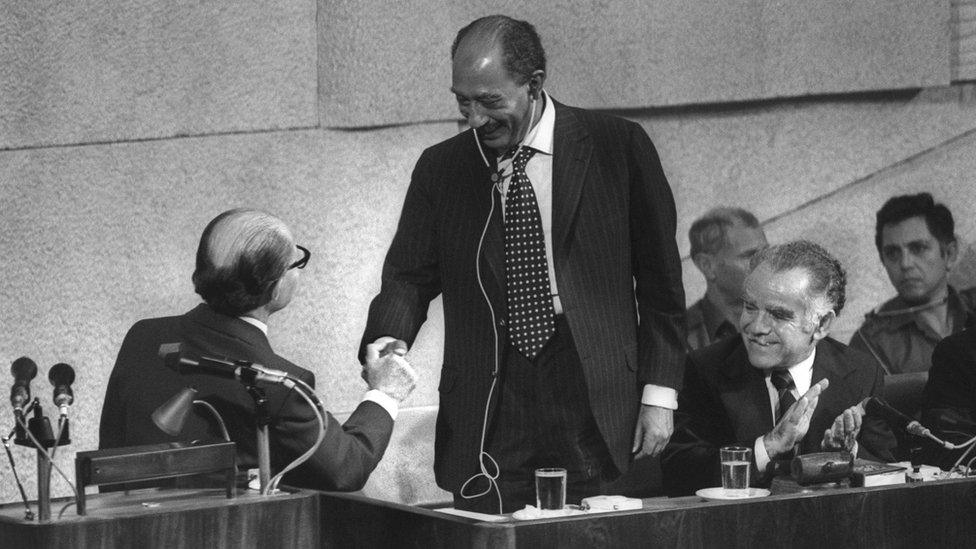
The taboo-breaking visit by Egyptian President Anwar Sadat (centre) to Israel in 1977 led to a diplomatic breakthrough - but ultimately, also, to personal tragedy
Mr Sadat's visit led, within two years, to the Camp David Agreements and the peace treaty with Egypt.
But it horrified many in the Arab world, and Mr Sadat paid the ultimate penalty in 1981 when he was assassinated for his role in signing the treaty by Islamist members of his own army.
For other leaders, secrecy is a part of their normal way of operating.
North Korea's late "Dear Leader" Kim Jong-il never confirmed his overseas visits ahead of time.
As a leader of a repressive state where he had inherited the leadership from his father, Kim Jong-il was probably paranoid about his own security while feeling no duty to make his activities public.
But his visit to China by train in 2006 shows how secrecy can mean a PR disaster.
'Orchestrated lie'
Mr Kim embarked on an eight-day, red-carpet visit, meeting President Hu Jintao and travelling to two Chinese provinces.
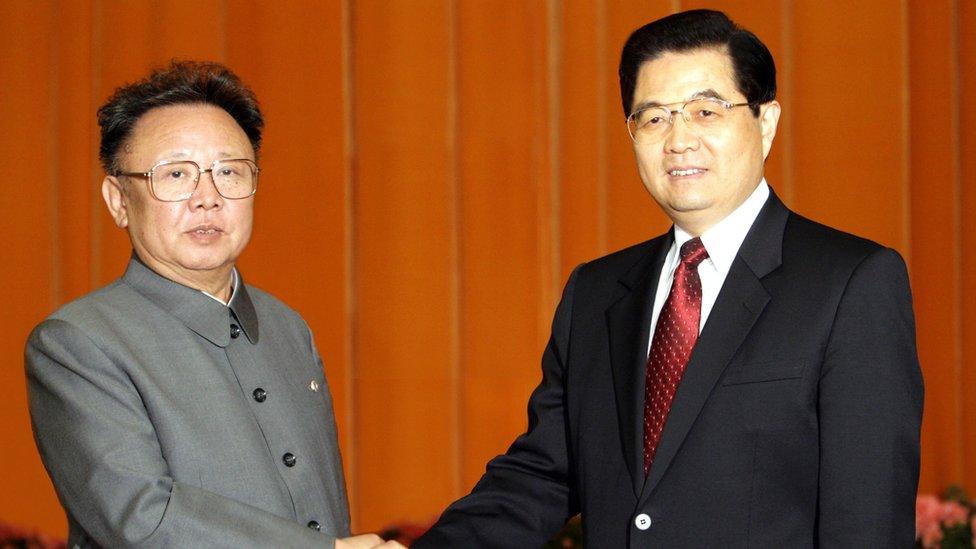
In 2006, the Chinese media attracted international condemnation when North Korean leader Kim Jong-il paid a lavish eight-day to China - in secret
For days, both officials and Chinese official media repeatedly refused to confirm the trip even amid sightings and rampant media speculation elsewhere - leading Reporters Without Borders to complain: "This is not so much a lack of transparency as an orchestrated state lie to protect the planet's worst dictator."
Mr Kim's son and inheritor of his title, Kim Jong-un, meanwhile, seems to shun overseas visits of all kinds - leaving his deputies to undertake this task.
The example of Kim Jong-il's 2006 trip is extreme, but it does point to a tension that exists when many world leaders make secret visits.
Should journalists feel obliged to respect official secrecy?
Perhaps yes, if security is a real concern. But if the leader's motive is garnering good publicity, some commentators argue, the media should not play along.